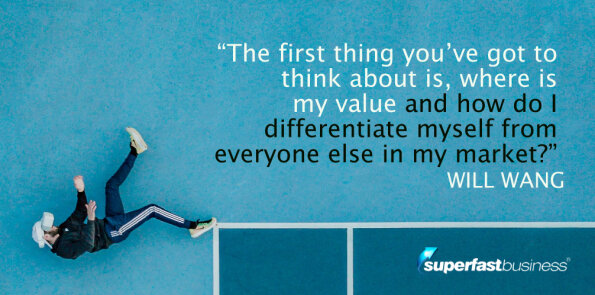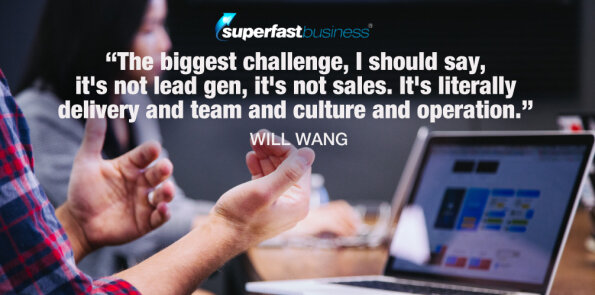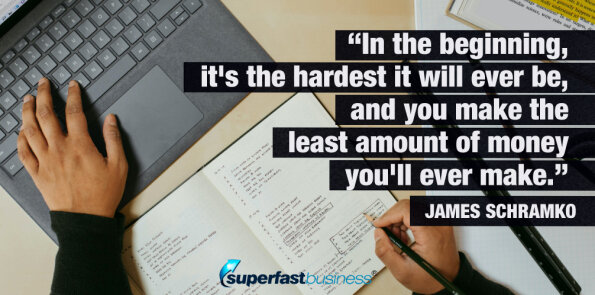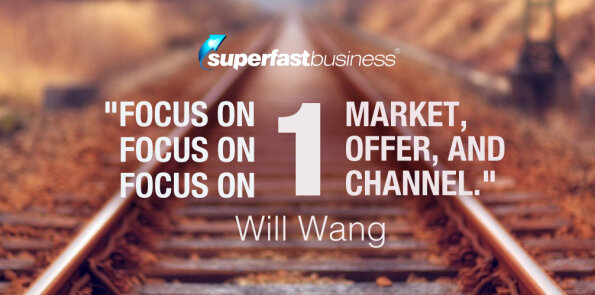What is freelancing? For many, it represents freedom - being your own boss, setting your own hours, choosing your clients. For Will Wang, it’s all that, and a seven-figure bottom line.
Many freelancers don’t make it past the $50K mark, so how did Will get where he is? Tune in as he shares his story and the principles that helped him become a highly successful marketing freelancer.
Podcast: Download (Duration: 32:49 — 30.2MB)
Get Notified Of Future Episodes Apple Podcasts | Spotify | Amazon Music | Android | Blubrry | Gaana | TuneIn | Deezer | Anghami | RSS | More
In the podcast:
02:25 – Freelancing defined – is this you? Will and James flesh out the term, and address a common misconception.
04:04 – A very important consideration. Our guest helps other freelancers by asking a crucial question.
07:55 – Are you working with the right clients? The kind of customers you get determine to a large extent how much you make.
09:57 – What do you do better than anyone? Charging premium starts with defining who you are.
11:54 – This is how you get the customers. Why would someone want to work with you?
14:23 – One market, one offer, one channel. This is how you differentiate.
17:38 – Why are you not earning more? It could be one or more of several reasons…
22:01 – Managing team and handling clients. It’s hard but necessary, especially in the beginning.
29:19 – Using the experience to help others. Will banks on what he’s learned to teach others how to freelance.
Discover your ideal business model with James’s help
Freelancer Will Wang is always a welcome guest on the show. He and James have a whole series of episodes together, on topics from email, to copywriting, to what’s current for marketing agencies.
Today, he and James discuss how Will has managed to achieve a feat among freelancers – to make a consistent seven figures through his marketing agency, Growth Labz. This is despite the many challenges freelancing entails, some of which James and Will unpack in this episode.
Freelancing defined – is this you?
A proper way, perhaps, to kick things off, would be to address the question, what is a freelancer?
Essentially, says Will, a freelancer provides a service to a paying customer. That might be copywriting, graphic design or web development. It’s really taking a skill set that you’re good at, and selling it, whether project-based or time-based, to a paying client.
Now one thing that comes to mind with freelancing, says James, is feast or famine, always having to chase customers. It’s usually stage one, where people need to get the word out about themselves to get hired. It’s, need money, gotta get a customer.
And that was Will’s initial thinking too, Will admits. It was James who helped him see the actual picture.
A very important consideration
Now when Will sets out to help other freelancers, the number one thing he asks them is, why do you need to grow? When James first asked him that big question, it gave him pause. Well, why do I?
“Why do you need to grow?”
It’s easy, says Will, to get caught in the cycle of, we have to grow, we have to grow. And the why or how you want to grow goes unexamined. Will thinks, before more leads and more income, should come the question, Do I actually need more? Or am I making okay money and would like more time resource? How do we structure growth so I get more freedom?
That was the understanding he gained from James when they first started working together. He realized he did want more income and revenue, but he had a reason for it, and so had to grow in a specific way.
Maybe it’s not more leads, he realized, but bigger clients and bigger or better projects, where there’s more revenue and more income to be had, but less clients and less but better work.
There’s got to be a book in that somewhere, says James.
Will says he knows someone who wrote a really good book.
Will is right, says James. When he speaks to people, they often have goals absorbed from peers or upbringing or society that aren’t really theirs – visions of big companies and flashy cars.
First of all, that doesn’t really satisfy. Second, the way a business starts is not how things work as it grows. If you want to scale, at some point you need new skills, like leadership. And you need eventually to be able to step away from the business without it grinding to a halt. That’s when your business model changes.
Will had his help at the start, but has gotten so good now that he owns and runs a seven-figure agency. And he helps other freelancers navigate what can be a very difficult journey.
What are some of the things that can make that journey easier?
Are you working with the right clients?
When Will first asked James for help, one of the most important things they looked at was how Will wanted to grow the business. He was then doing $20,000 a month, working with 15 or more clients. At $1500 to $2500 per client, it was a lot of work.
James asked what value Will’s clients got. Will realized they were regularly helping businesses grow by 30 percent, which was good growth. But their typical client made only around 100 grand a year.
If Will’s agency could work for businesses doing $1 million, $2 million, $3 million a year, 30 percent growth could be $300,000, $600,000, $1 million. And they could then start charging what they were worth.
What do you do better than anyone?
That was a massive shift for Will, and hand in hand with it was the thinking, what do we do really, really well? And positioning their business around that.
When Will first spoke to James, he said he was a Facebook marketer. One of about five million out there, James chuckled.
What really helped Will stand out was copywriting, and storytelling. So his agency packaged their services as a premium copywriting agency or freelancing business that did Facebook ads to get eyeballs onto the copy. That combination of high-ticket, high-value, high results, plus a specialization, let them jump up their prices fairly quickly.
It’s helpful for most freelancers, says James, to have someone else sit down and figure out what they do. Because some people don’t know. They get so technical, under the hood. They fall in love with their software, or the training they’ve done or the certification course they’ve paid for. What they don’t think about is the customer, and the customer is really the whole purpose of what they do.
This is how you get the customers
So why not talk about getting customers? James thinks Will is best in the world at it, both for clients and for his agency. What can they talk about in the context of freelancing, especially in the early phases?
That’s high praise, says Will, coming from James.
The biggest problem he sees many freelancers have, and one he used to have before working with James, was talking about what they do.
If you say you’re a graphic designer, you put yourself in a category with thousands. And that may force you to compete on price, or on any number of things you don’t want to compete with. You may have to offer more for less, which is the exact opposite of what James teaches.
 So the first thing you’ve got to think about is, where is my value and how do I differentiate myself from everyone else in my market?
So the first thing you’ve got to think about is, where is my value and how do I differentiate myself from everyone else in my market?
A graphic designer might say, I only design a certain type of logo for ecommerce companies, because I know that having a logo can increase your conversion by 10 percent, because it conveys trust.
Narrow it down into the thing that you’re world class at, that you can compete with anyone in the world on, and back yourself on it. For Will, that was story-based copy, conversion plus story.
One market, one offer, one channel
Once you differentiate yourself, says Will, focus on one market, focus on one offer, and focus on one channel. Don’t do graphic design for everyone. Focus on a market that you really, really get into, that you really get immersed in and you understand their language.
For Will, that was tech. He got really immersed in the tech industry. And he could actually speak the language – who’s been funded by what VC, what the VC’s goals are, what style the VC works in. He knows the numbers and metrics the VC will ask from their investment companies. So he can easily go into a company and say the right things, reference the right information.
That’s the reason so many tech companies go to them. There’s a level of trust built in. So go really deep into one market, really focus on it. From experience, says Will, you can get to seven figures really quickly with just one specialized market.
The next part of that is the offer. What do you offer that’s so compelling, clients will pay you even if you’re premium and more expensive than anyone else?
For Growth Labz, that’s guarantees; it’s case studies that they build, examples they give, showing quick results first. All of that is wrapped into an offer. And their offer is so much better than their competitors that even when they sometimes double or triple the pricing, they still win over the competition.
Then you look at channel. To get to seven figures, Will gets leads from only two channels. One is podcasting and speaking. The other is cold emails. Whether it’s ads, whether it’s cold emails, he says, just focus on one channel, and really get it right, and that will be more than enough to grow your freelancing agency business.
You’re choosing who you’re going to serve, says James, you’re choosing how you’re going to reach them, and you’ve got an offer that’s compelling.
He’s found one helpful tool as a starting point is to work out what he doesn’t want to do, who he doesn’t want to serve, and what channels he’s not that interested in. And that will guide you – what’s left? And what do you lean towards naturally? And that can be a good starting point.
Why are you not earning more?
If a freelancer is in the stage of not quite seven figures or even mid sixes, and they want to know why, they can review this episode.
“Maybe you’re trying to serve everybody, which means you’re serving nobody.”
It could be you don’t know who you’re serving or you’re trying to serve everybody, which means you’re serving nobody. Maybe you’re not charging a premium, you’ve allowed yourself to become commoditized because your offer is weak, or your messaging is not good enough.
“Freelancing is a really big mental game, especially in the beginning.”
Or a big one, says James, is that your own personal value of your skill set could be lower than the client might think it is. Freelancing is a really big mental game, especially in the beginning. Confidence has to play into it.
Because you are essentially the product in the beginning, and you have to sell yourself well. And James thinks that has a huge impact on what you can charge and who you can charge. People who haven’t made 10 grand a year freelancing will think twice before charging that much a month. What does Will think?
James is completely right, says Will. He was stuck there himself till James helped him out. Will was about to charge a client $3000 for his services, and James stopped him. Will could make this client 150 to $500,000, he said. Why was he charging three grand?
Will put a five-figure proposal in front of the client, who accepted it. That changed Will’s entire business, and, he says, his life.
Managing team and handling clients
James wants to talk about the delivery experience. Apart from what they’ve mentioned, there are two things that make freelancing hard.
One is, at some point, you need a team. And most people working solo are not yet skilled at leadership. It’s not their fault – they just haven’t had experience.
The other thing, which is really hard, is attendant from day one. That is the actual client. You’ll have to deal with clients in the beginning, and they’re going to have expectations. But at some point, says James, you probably want to migrate a layer away from the client if you want any chance of sanity.
Can Will speak about that?
That was a big struggle for him in the beginning, says Will. It comes back to effective hourly rate, or EHR, how much you make per hour. In the beginning, as a freelancer, you’ll be doing everything yourself. It’s part of the game, but it naturally erodes your EHR. And it meant, for him, not focusing on the things that brought the most value, like copywriting.
There was a massive skill gap from being an employee to becoming a freelancer and knowing how to build and manage a team. And one of the right things Will did right was to understand that he couldn’t do everything. He had to get people better than him to do what they were good at.
The cool thing now, he says, is that there’s so much outside help available. James, for instance, runs a business with his wife that sources and places virtual assistants from the Philippines.
Will’s first VA is still with him, part of a team of 20. And she took a lot of his plate at the very beginning.
 You might not end up with 20 people, but hire someone now to take everything you shouldn’t be doing off your hands. That will help build your experience in hiring, managing, setting expectations, communications, all the important stuff you’ll need if you do want to hit that seven-figure mark.
You might not end up with 20 people, but hire someone now to take everything you shouldn’t be doing off your hands. That will help build your experience in hiring, managing, setting expectations, communications, all the important stuff you’ll need if you do want to hit that seven-figure mark.
The biggest challenge, Will would say, is not lead gen, it’s not sales. It’s literally delivery and team and culture and operation. The problems you have now are very different from the challenges you’ll have when you grow bigger. So start now, he says. Start wrapping your head around management, around investing into the business, because it’s a mind game.
 But the irony is, says James, it’s so much easier when you’ve got the momentum than it was in the beginning. In the beginning, it’s the hardest it will ever be, and you make the least amount of money you’ll ever make. And you’re doing the most amount of work.
But the irony is, says James, it’s so much easier when you’ve got the momentum than it was in the beginning. In the beginning, it’s the hardest it will ever be, and you make the least amount of money you’ll ever make. And you’re doing the most amount of work.
Now James does the least in his business. And some people get there much faster. When he and his wife started their VA agency, his wife almost immediately hired someone to take over the day-to-day stuff, which impressed him.
“Be earlier to hire than you think.”
So be earlier to hire than you think, is really one of the lessons.
Using the experience to help others
Will now helps freelancers on their journey based on what he’s learned.
It’s a passion project of his, he says. He’s gone through the hard times, from barely making ends meet to now where things are going very well. And he loves this other side where he can now guide freelancers and see the transformation in their lives. He gives them real, practical experience and tips, not theory, and enjoys seeing them grow.
Will is ready now to take this out to the world and help more people. Freelancing Life is the name of his new business, which he’ll be running concurrently with Growth Labz. FreelancingLife.com is the website.
“There is a whole world outside of corporate.”
It’s a huge market, says James. Post-pandemic, people are discovering what he and Will already knew, that there is a whole world outside of corporate.
If you want to discover more of what Will’s about, there’s the entire Get Clients Series. And if you want help with lead gen, he and his team are at GrowthLabz.com.
Join other thriving business owners inside the SuperFastBusiness community
Liked the show? Leave us a review on iTunes










Leave a Reply